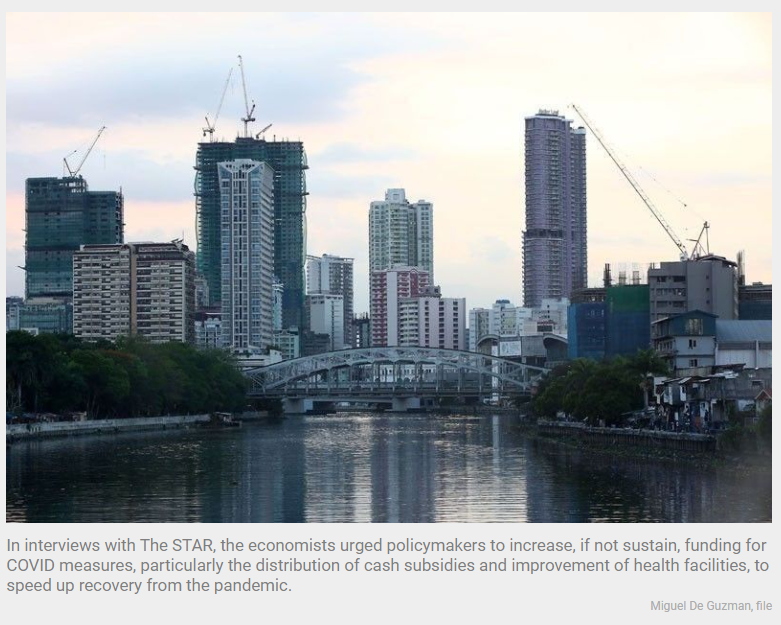Philippines: GDP growth, more jobs needed to ease pandemic spending
MANILA, Philippines — The government should begin tightening its belt on COVID-19 spending only when economic and employment gains are sustained, according to several economists.
In interviews with The STAR, the economists urged policymakers to increase, if not sustain, funding for COVID measures, particularly the distribution of cash subsidies and improvement of health facilities, to speed up recovery from the pandemic.
Jose Enrique Africa, executive director of think tank IBON Foundation, said COVID spending should only be tempered when the “R” or the number of people an infected person can pass on a virus to, falls to less than one.
OCTA Research Group fellow Guido David yesterday said the R has shrunk to 0.96 as of Sept. 28. However, he warned that hospitals in affected areas remain flooded with infected patients due to a resurgence in COVID cases.
Africa also said the government should create jobs at a pace that the number of unemployed is cut to pre-pandemic levels. By then, policymakers can consider slashing COVID expenditures by lifting emergency measures.
“In terms of livelihood, the official unemployment and underemployment rates should at least be at their levels before the pandemic hit, at around five and 15 percent, respectively,” Africa said.
De La Salle University economics professor Maria Ella Oplas said the economy should post consecutive gross domestic product (GDP) growth to undo the five quarters of decline from the first quarter of last year to the first quarter of 2021.
GDP turned positive only in the second quarter, expanding by 11.8 percent, due to a low base as the lockdown hampered trade and travel last year.
“Sustained economic growth on GDP, low unemployment and stable prices – these are the three macroeconomic goals that any country wishes to accomplish. If we see improvements on these indicators, we can slowly tighten our spending,” Oplas said.
The unemployment rate declined to 6.9 percent in July – the lowest during the pandemic – from 7.7 percent in June. However, this translates to at least 3.07 million jobless Filipinos, or 680,000 more than the 2.39 million in January 2020, prior to the health crisis.
For as long as the unemployment rate stays elevated, Africa and Oplas said the government must finance stimulus packages that will distribute cash subsidies and upgrade health facilities.
They said economic managers should set aside their debt and deficit caps for now to provide the capital needed on programs to contain the spread of COVID.
Senators have yet to approve their version of the Bayanihan to Arise as One Act, or Bayanihan 3, as state economists warned the stimulus package would bloat the fiscal deficit beyond program.
The government expects the budget deficit to swell to P1.85 trillion or 9.3 percent of GDP this year, and looks to reduce it to 7.5 percent in 2022, 5.9 percent in 2023 and 4.9 percent in 2024.
Economic managers said any emergency expenditures, such as the P401 billion Bayanihan 3, will disrupt the plan to cut the fiscal balance to pre-pandemic level.
“Government spending for the pandemic is required. There is nowhere to go but to spend for the vaccination, the hazard pay for the health workers and health requirements for those infected by the virus,” Oplas said.
According to Africa, the economy can afford to sustain a budget deficit of up to 13 percent for as long as the reason for hitting such a level is to spend for pandemic recovery.
“The most important thing is probably justifying the deficit and establishing that this is necessary to contain the pandemic, alleviate suffering, fix economic scarring and push recovery,” he said.
Based on records from the Asian Development Bank, the Philippines has spent $30.71 billion or 8.7 percent of GDP for COVID-19 measures as of Aug. 30, trailing Malaysia’s 43.5 percent, Singapore’s 30.52 percent, Thailand’s 20.88 percent and Indonesia’s 11.35 percent.
Source: https://www.philstar.com/business/2021/09/30/2130618/gdp-growth-more-jobs-needed-ease-pandemic-spending


 English
English




